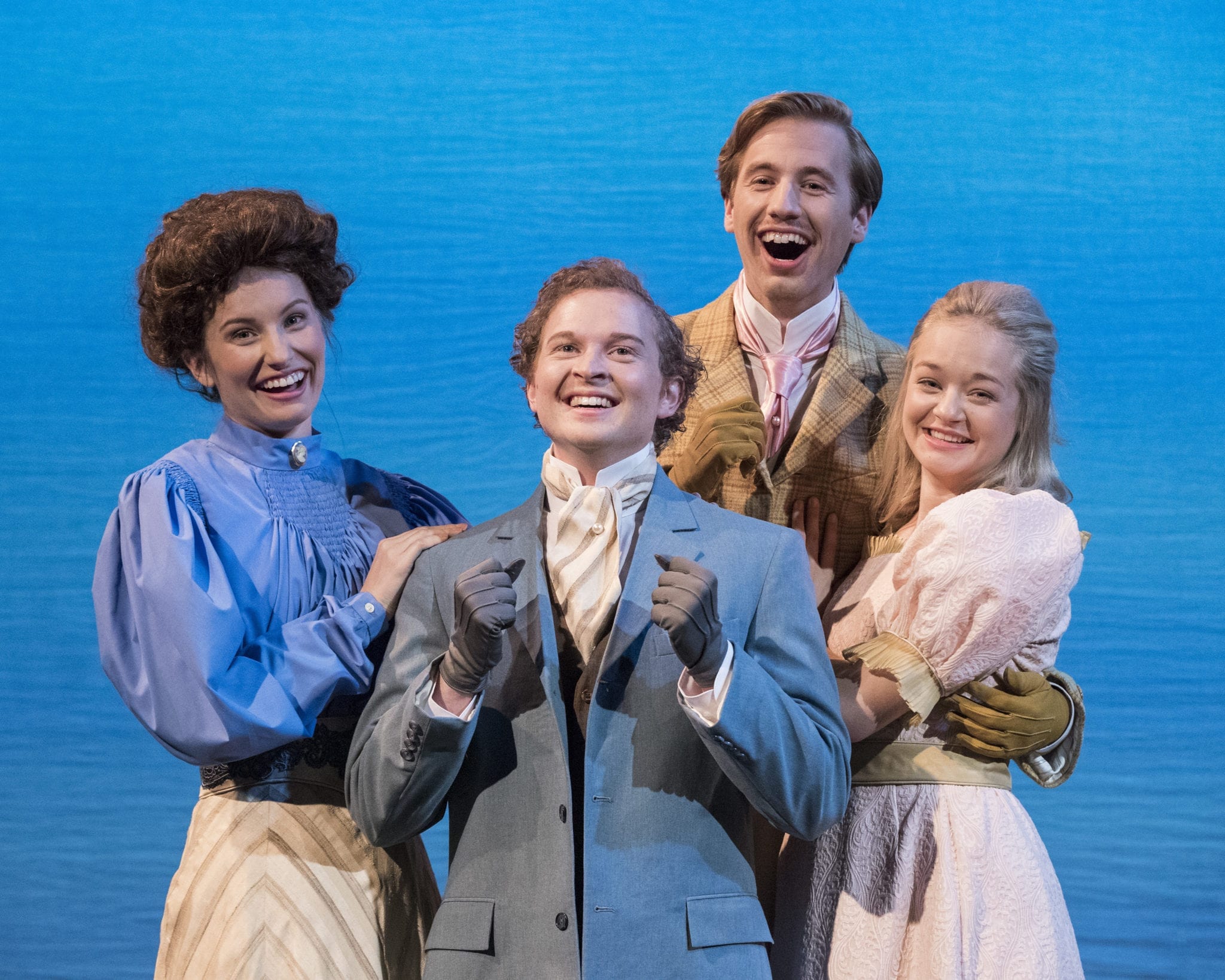PROVO — Oscar Wilde‘s fans in Utah have a new production of The Importance of Being Earnest that showcases why they love Wilde’s work. As an added bonus, BYU’s production of this classic comedy of manners and mix-ups shows why the university has a reputation for mounting respectable productions of classic plays.

Director Rodger D. Sorensen understood fully that for this show, as Gwendolen says in the third act, “Style, not sincerity, is the vital thing.” A successful production of The Importance of Being Earnest should not take itself too seriously, and Sorensen’s principal aim in this version was to entertain. Much of the humor in Wilde’s script derives from the contrast of the social attitudes of the 1890’s with the silliness of the dialogue. Nearly every visual detail—including stylized silhouetted tableaus before each scene, or the balanced symmetry of the set—emphasized the social rules of the era. When coupled with the frivolous dialogue of the play, Sorensen’s vision of contrasts effectively maximized the humor of the show. On the other hand, I thought that the use of “burglars” to change the furniture on stage during intermission was chintzy, and the choice of “You Make My Dreams Come True” as exit music was incongruous with the mood of the rest of the evening.

Under Sorensen’s direction, the actors were masters of the show’s literary dialogue. The Importance of Being Earnest has the potential to be a show that drags when actors do not engage in rapid-fire delivery of the dialogue. Sorensen ensured that the show clipped along well. He also added some nice visual moments, such as when Algernon and Cecily meet for the first time, or when Jack proposes to Gwendolen. These moments added some welcomed non-verbal humor to the play.
In the role of Jack, Sean Worsley gave the best performance in the cast. His self-satisfied smile when Jack knew he was manipulating social norms for his own advantage brought a subtle touch of intelligence to the character. Yet, the character’s joy at learning the truth about this past was sweet and softened Jack’s devious nature. Worsley also provided the right balance of debonair self-confidence to make Jack seem charming but not big-headed. Another noteworthy cast member was Alana Jeffery as Lady Bracknell, the personification of the stuffy social rules of the era. Jeffery’s incensed reaction to Jack’s history as an abandoned child found in a handbag was some of the most accessible humor in the first act, and her later sudden entrance added tension to an otherwise frivolous scene.

I also appreciated the performance of Madison Dennis as Miss Prism, a governess. Dennis was able to bring a surprising level of depth to the role, and by the end of the show Miss Prism’s genuine attachment to her pupil (Cecily) was obvious. Spencer Hunsicker handled the slightly non-naturalistic acting style well, giving life to a caricature of the carefree bachelor, although his repertoire of gestures and mannerisms was limited. (Hunsicker seemed to hold his arms in the same position for long periods of time in the play, for example.) Meg Flinders also made her character, Cecily, more realistic, and I was grateful when her ingénue had actual emotions beyond affection for her man. Finally, Emma Widtfeldt was excellent in her portrayal of Gwendolen, and gave her character an intelligence and power that fit nicely into the last half-hour of the play when Jack must acquiesce to her demands. It is important to note, however, that these generally pleasing performances were marred by some inconsistent accents, especially at the beginning of the second act.
Despite the pleasing direction and performances, I still found this show tiresome. Wilde’s script is too self-consciously witty, and the dialogue is artificial and stilted. People have never talked the way they do in Oscar Wilde plays, and much of the dialogue exists solely to set up the next joke. I recognize that these are the sort of things that many people love about Oscar Wilde, though, and most of the audience was laughing much more than I was. Yet, nothing in this production will change anyone’s opinion about Wilde’s writing; his fans will likely adore the show, while his detractors will be reminded of everything that makes him an overrated writer.

Whatever one may think about the script, the visual elements of the show were pleasing, especially Sarah Stewart‘s Victorian costumes. The color coordination between the principal couples (blue for Jack and Gwendolyn and pink for Algernon and Cecily) was a bit obvious, but still showed nonverbally that these characters would destined to be together when the show concluded. My favorite part of the costumes, though, were the smart jackets that Miss Prism and Gwendolen wore, which were perfect for the historical era and matched each woman’s skirt perfectly. Travis Coyne‘s white set had a touch of ornate embellishment that coincided with the orderly but sophisticated feel of the play. The only visual element that didn’t work was the fake beard (from makeup and hair designer Sarah Bult) on Reverend Chasuble (played by Bradley Mackay), which greatly detracted from the character’s scenes.
Although The Importance of Being Earnest is not a show that I would ordinarily choose to see, even a critic of Oscar Wilde’s work has to admit that there is much about this production that is commendable. Wilde’s fans will adore seeing their favorite characters portrayed by professional-quality actors, and the visual elements are effective in transporting the audience back to late Victorian England. Add in the quality direction, and the result is a show worthy of its audience’s time.
And that’s the earnest truth.
[box]The Importance of Being Earnest plays Tuesdays through Saturdays (except November 1) at 7:30 PM through November 12 and at 2 PM on October 29 and November 5 in the Pardoe Theatre in the Harris Fine Arts Center on the campus of Brigham Young University. Tickets are $10-16. For more information, visit www.byuarts.com.[/box]
